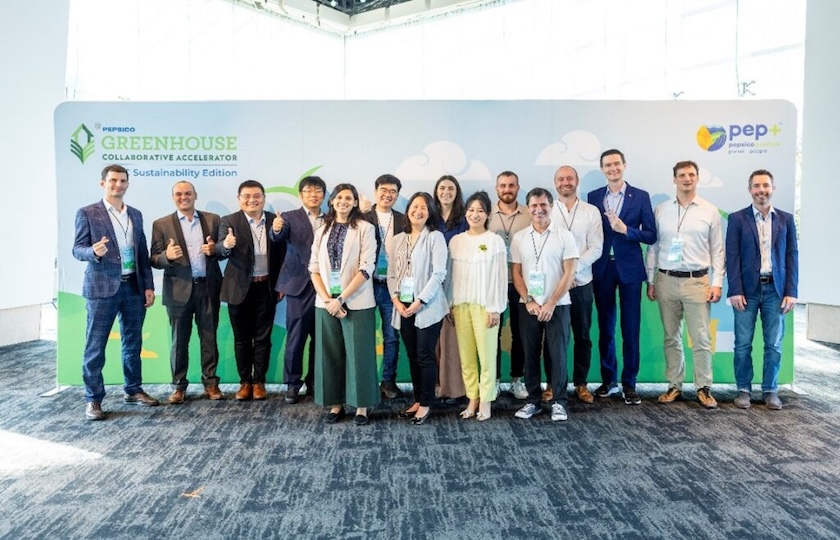PepsiCo has launched its second Greenhouse Accelerator program in the Asia Pacific (Apac) region and has been receiving applications from qualified eco startups since the start of the year.
As with last year’s successful program, PepsiCo wants to support and collaborate with innovative and sustainable companies to make an impact on the food and beverage industry in the region.
The food and beverage giant plays an active role in the Asia Pacific’s transition towards more sustainable supply chains to reach net zero by granting US$20,000 to 10 selected applicants as well as mentoring from PepsiCo’s subject-matter experts. In September, the finalist will receive a US$100,000 prize in Thailand.
The Greenhouse Accelerator Apac Sustainability Edition will boost regional entrepreneurs with solutions in the sustainable packaging and agriculture spaces, climate action and circular economy to be net zero by the end of this year.
“Last year, we initiated seven pilot projects, each contributing to our sustainability goals and demonstrating the power of partnership,” said Wern-Yuen Tan, CEO of PepsiCo, Apac. “Apac is a focal region for agri and food tech innovation, and with new partners joining us, we aim to use our reach to positively influence the food ecosystem.”
The seven pilot projects from last year’s Greenhouse Accelerator Edition are:
Adiona
Adiona’s SaaS solution focuses on last-mile delivery-route planning and optimisation, based on real-time data. The data pilot showed route optimisation could lead to 19.4 per cent reduction in both distance traveled, and CO2 emitted from Tingalpa’s logistics routes.
Aspiring Materials
Aspiring Materials captures CO2 emissions using existing materials occurring in nature. Mentors worked with the startup on marketing material and identified an opportunity to pilot the proof of concept. Now, Aspiring Materials is partnering with the PepsiCo Wiri site in Auckland, New Zealand, to pilot a carbon capture structure.
Remakehub
Remakehub drives circularity of packaging through upcycling low-value plastic and consumer education.
Powered Carbon
Powered Carbon converts carbon dioxide into useful chemicals using clean energy. With mentors, they identified applications for probiotics in agriculture, a field the team had never explored prior to the Accelerator. They partnered with PepsiCo’s agriculture team & fertiliser supplier in China to develop a fertiliser component. Powered Carbon’s low-carbon fertiliser solution has since been piloted on PepsiCo’s potatoes grown in Guangdong, China.
HRK Group
HRK Group is working against plastic pollution by developing waterproof paper food packaging that is 100 per cent biodegradable, compostable, and recyclable. HRK explored the process of transforming potato starch from PepsiCo’s potato chip lines into secondary packaging.
MEDS Ventures
MEDS’ Decaplan tool is the only digital platform in the world that allows end-to-end multi-energy and multi-objective optimisation and decarbonisation of industrial sites. As part of the pilot, MEDS is working with PGCS Singapore to assess energy savings on plant equipment.
Green2Get
Green2Get’s digital platform and application promotes the circular economy by connecting stakeholders in the recycling value chain, facilitating efficient trading of materials, and encouraging sustainable recycling behaviour modification. Green2Get’s pilot involved a social media campaign with snackfood brand Lays in Thailand to drive collection of flexible film packaging.
“As a leader in the beverage industry, Suntory PepsiCo Thailand is proactively addressing environmental challenges through an unwavering commitment to sustainability, innovation, and compliance,” said Ashish Joshi, CEO of Suntory PepsiCo Beverage in Thailand.
“We are dedicated to optimising internal processes and reducing greenhouse gas emissions across our entire value chain while collaborating with other stakeholders to achieve a net-zero carbon society. We clearly define priority issues, including achieving water conservation and replenishment, fostering a sustainable packaging management for the circular economy, and greenhouse gas reduction throughout our operation.
“Emphasising the importance of collaboration, we are pleased to participate in this program to build a sustainable society that prioritises environmental responsibility,” he concluded.
The program has included over 86 companies across the Middle East and North Africa, Europe and Sub-Saharan Africa, the US, and Apac and raised more than US$20 million for the emerging startups.
Among over 100 applications across the Apac region, last year, the final winner – Powered Carbon’s low carbon fertiliser – which uses CO2 to cultivate bacteria, has since been tested on potatoes at PepsiCo’s China Shandong Farm. The giant has partnered with Suntory PepsiCo Beverage Thailand, Suntory PepsiCo Vietnam Beverage, and Circulate Capital to deliver a comprehensive range of environmental issues and push a generation of entrepreneurs who can concrete positive impacts to multiple facets of sustainability.
This July, startups will attend a midpoint virtual event to reflect on previous experiences and momentum built, reach goals and accelerate action plans, and collaborate with PepsiCo mentors and experts.



